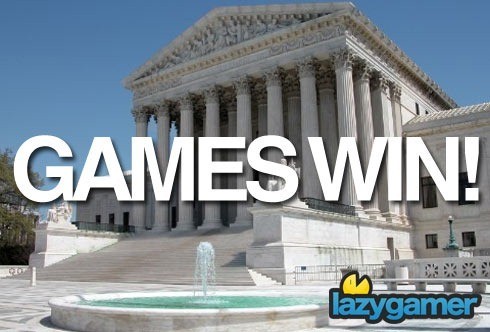
In 2005, California State Senator Leeland Yee wrote a proposal, signed in to law by then governor Arnold Schwarzenegger that would restrict the sale of violent videogames to minors, making it illegal to sell games depicting gratuitous violence to children. Naturally, video game makers and publishers fought the bill. It’s been six years of legal to and fro, but the case finally come to a close, with the Supreme Court of the United States siding with the videogames industry.
"The act forbidding sale or rental of violent games to minors does not comport with the 1st Amendment.†said Justice Antonin Scalia following the 7-2 ruling. “The basic principles of freedom of speech ,†he said  do not vary’ with a new and different communication medium," effectively bundling games with other media like books, film and television.
The argument, he concluded "would fare better if there were a longstanding tradition in this country of specially restricting children’s access to depictions of violence, but there is none." Citing examples of violence in classic literature, he continued "Reading Dante is unquestionably more cultured and intellectually edifying than playing Mortal Kombat. But these cultural and intellectual differences are not constitutional.†It’s a permanent injunction – so there’ll be no appeals, closing this chapter of anti-videogame reaction forever.
The videogame industry is naturally overjoyed at the ruling. "This is a historic and complete win for the First Amendment and the creative freedom of artists and storytellers everywhere," said the head of the Entertainment Software Association, Michael Gallagher. "Today, the Supreme Court affirmed what we have always known – that free speech protections apply every bit as much to video games as they do to other forms of creative expression like books, movies and music."
I’m firmly of the opinion that children should indeed have restricted access to violent (and indeed, overtly sexual) games – but it’s the responsibility of parents, and not the law, to impose those restrictions. Video game age ratings – whether doled out by the ESRB, PEGI or our own FPB are completely unambiguous, and it just takes a little effort from parents to keep their darlings from ripping off heads and slicing up nether regions in Mortal Kombat.
There you have it. Videogames, in the US at least, are protected by the first amendment – which brings forth the question of what games, exactly, are worth protecting. What M rated games have you played recently deserving of posterity?
Sources: Kotaku, Gamepolitics, ScotusBlog
Last Updated: June 28, 2011



















